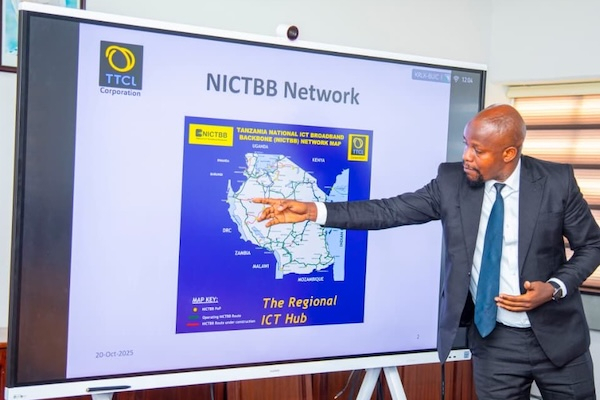Tanzania’s plan to extend its National ICT Broadband Backbone (NICTBB) to the Democratic Republic of Congo (DRC) was discussed on Oct. 20, 2025, during a meeting at Tanzania Telecommunications Corporation (TTCL) headquarters in Dar es Salaam.
The project will lay a submarine fiber-optic cable across Lake Tanganyika, linking Kigoma in Tanzania and Kalemie in the DRC over roughly 160-186 kilometers.
The Tanzanian delegation was led by Moremi Marwa, TTCL Director General, and Leo Magomba, ICT Infrastructure Director at the Ministry of Communication and Information Technology. The Congolese side was headed by Prosper Ghislain Mpeye, Director General of the Société Congolaise de Fibre Optique (SOCOF).
Few details were disclosed, as the talks are covered by a confidentiality agreement signed in February 2023. The two sides are completing final preparations before construction begins in early 2026, pending environmental approval. Full commissioning is expected by late 2027.
The $15-20 million project is structured as a public-private partnership involving Mauritian firm Bandwidth and Cloud Services Group for technical expertise. The governments of both countries will hold quarterly meetings to track progress and manage financial risks.
Part of the AUDA-NEPAD Priority Action Plan (2021-2030), the interconnection is identified as a key link for digital integration in East and Southern Africa. The NICTBB already connects Zambia, Malawi, Kenya, Uganda, Rwanda, and Burundi; adding the DRC would complete an East–West fiber corridor, boosting regional connectivity.
TTCL, the implementing agency, said the project will accelerate the DRC’s digital transformation and spur economic growth. Fiber deployment could cut bandwidth costs by half and benefit sectors from mining to digital finance, education, and healthcare.
The cable will use single-mode G.652D fiber, starting at 100 Gbps, expandable to several terabits. Joint environmental studies with the Société Congolaise des Postes et Télécommunications (SCPT) aim to ensure compliance with international standards, including the Ramsar Convention protecting Lake Tanganyika.










